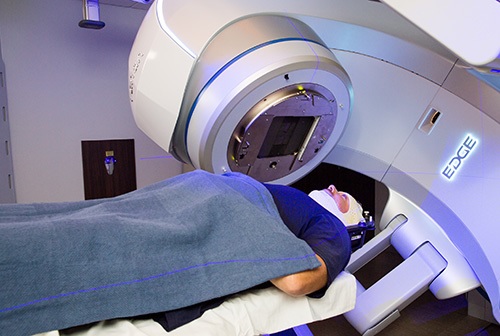The National Cancer Institute recently awarded more than $7.9 million to support a new Radiation Oncology-Biology Integration Network (ROBIN) center at Winship Cancer Institute of Emory University and the Cleveland Clinic.

October 3, 2022
The National Cancer Institute recently awarded more than $7.9 million to support a new Radiation Oncology-Biology Integration Network (ROBIN) center at Winship Cancer Institute of Emory University and the Cleveland Clinic. The ROBIN Genomic-TME-Temporal Dynamics Center will seek to uncover the genetic and environmental factors, as well as the timing and interactions, that influence the effectiveness of radiation-based combination therapies.
"The Winship-Cleveland Clinic team is one of three teams that received the ROBIN center award, which is a testament to the team-based approach Winship pursues to solve complex cancer problems," says principal investigator David S. Yu, MD, PhD, radiation oncologist and member of the Cell and Molecular Biology research program at Winship Cancer Institute, the Jerome Landry, MD, Chair of Cancer Biology and director of the division of cancer biology in the Department of Radiation Oncology at the Emory University School of Medicine.
"Radiation therapy is a bedrock of cancer treatment, with about two out of every three patients with cancer receiving it. Yet, despite its widespread use, our understanding of the molecular mechanisms and biology of response to radiation remains poor," says Timothy Chan, MD, PhD, chair of the Center for Immunotherapy and Precision Immuno-Oncology at the Cleveland Clinic, who serves as contact principal investigator of the ROBIN center. "The ROBIN center will enable us to develop more effective radiation and immunotherapy combinations and better understand how these approaches work."
Highlighting the interdisciplinary teams of researchers behind the ROBIN program, Michael Graham Espey, PhD, MT, chief of the NCI’s radiotherapy development branch, says, "There is strong potential for synergies to develop that will uniquely maximize team-science approaches between clinicians, radiation and cancer biologists, medical physicists and computational scientists towards our common goals as a Network to understand the biological basis of radiation responses and develop ways to predict and improve benefit for cancer patients."
Understanding what makes combination treatments effective
Although radiotherapy, alone or in combination with other treatments, is used to treat about two-thirds of all cancer patients, the mechanisms driving response and resistance are poorly understood.
New efforts to improve treatment for many cancer types focus on using combination therapies in which radiation is used with drugs that affect the whole body, underscoring the importance of understanding what makes them effective.
The central hypothesis behind the ROBIN studies is that specific genetic and immunologic mechanisms underlie sensitivity and resistance to radiation-based combination therapies. Some of the most promising new biologics being studied for use with radiation are antibody-drug conjugates, immune cells that are chemically joined with a chemotherapy drug to deliver the drug directly to the cancer cells, and immune checkpoint inhibitors, a type of drug that blocks proteins made by some cancer cells or immune system cells, such as T cells. Each of these approaches enhances the anti-tumor effects of radiation.
Using an innovative molecular characterization trial testing radiation plus antibody-drug conjugates in bladder cancer, and radiation plus immune checkpoint inhibitors in head and neck cancer, ROBIN will seek to characterize the mechanistic drivers underlying these next generation radiotherapy-based combinations.
ROBIN's objective is to rigorously dissect mechanisms of efficacy and resistance to the most promising radiation-based combinations: (1) radiation plus antibody-drug conjugates, and (2) radiation plus immune checkpoint blockade, and compare these to present standard of care, the chemotherapy drug cisplatin plus radiotherapy. Its goals are to leverage new insights in disease pathogenesis to improve the outcomes of radiation-based multimodal therapy.
Yu says the ROBIN center "will help us better understand mechanisms underlying efficacy and resistance to radiation and the most promising radiation-based combination therapies, including with immune checkpoint inhibition based on clinical specimens collected from patients.” He adds that this research "may lead to new insights into improving patient outcomes."
A major focus at Emory is to understand the molecular foundations of patient response to radiation and immunotherapy in a trial run by Molecular Characterization Trial co-leader Nabil F. Saba, MD, FACP, the Lynne and Howard Halpern Chair in Head and Neck Cancer Research at Winship Cancer Institute and professor and vice chair in the Department of Hematology and Medical Oncology at the Emory School of Medicine.
Key Winship and Emory University research partners include: project co-leader Zachary S. Buchwald, MD, PhD, Winship radiation oncologist and research member and assistant professor, Emory Department of Radiation Oncology; project co-leader and Cross-Training Core co-leader Xiaofeng Yang, PhD, DABR, Winship research member and associate professor, Emory Department of Radiation Oncology; and Translational Core co-leader Haydn T. Kissick, PhD, Winship research member and assistant professor, Emory Departments of Urology and Microbiology and Immunology.
They are joined by co-investigators Rafi Ahmed, PhD, co-leader, Cancer Immunology Research Program at Winship Cancer Institute of Emory University, and professor, Department of Microbiology and Immunology, Emory University School of Medicine; Manoj Bhasin, PhD, MS, Winship research member and acting associate professor, Departments of Pediatrics and Biomedical Informatics, Emory University School of Medicine; Daniel Lubin, MD, Winship research member and assistant professor, Department of Pathology and Laboratory Medicine, Emory University School of Medicine; and Jeffrey Switchenko, PhD, MS, Winship research member, scientific director of Winship's Biostatistics Shared Resource and assistant research professor, Department of Biostatistics and Bioinformatics, Rollins School of Public Health of Emory University.
The ROBIN center is supported by National Cancer Institute award number 1U54CA274513-01.

